Each company has a unique culture as I’ve seen from working for a long time. Especially, from the perspective of foreigners, there might be weird culture in our workplace. There is a moment that you might have been confused. Today, I’m going to tell you about some unique customs. In case you might have to work at a typical Japanese company tomorrow, I’ll tell you about them as easily as possible. Let’s get started.
1. Cho-rei (朝礼)
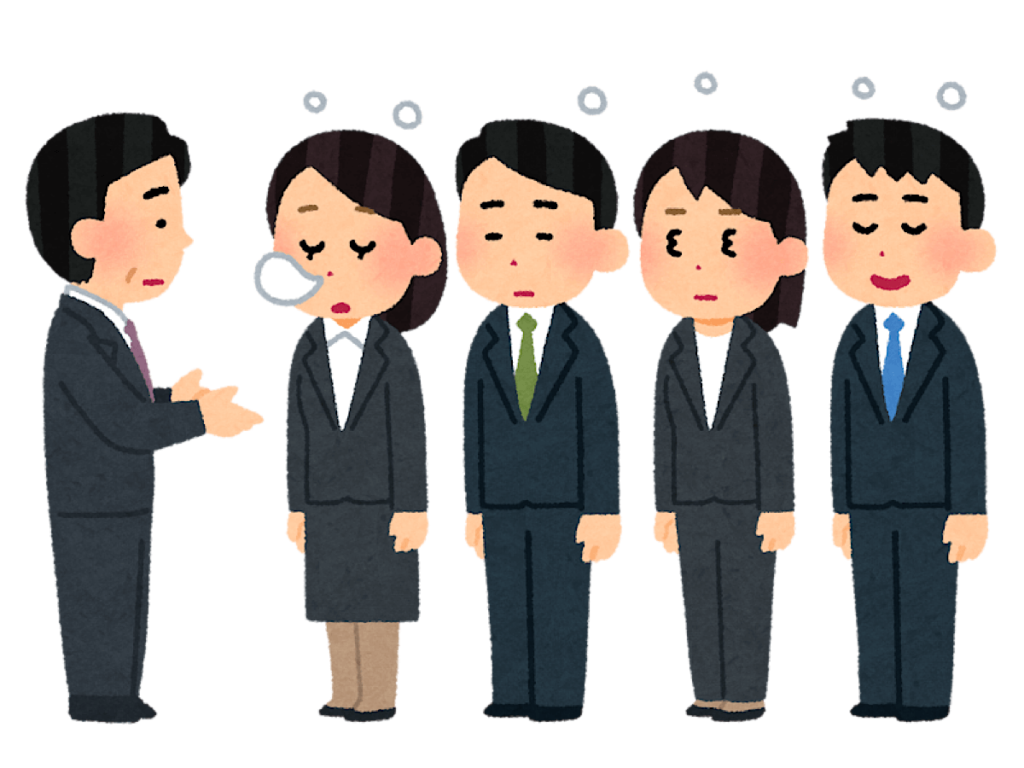
Cho-rei (朝礼) is one of the most unique customs in Japanese workplaces, I’d say. Cho-rei, literally means “a small meeting in the morning.” It doesn’t only take place at workplaces, you might see it at schools. When I was a student, they used to have a cho-rei. Teachers let students gather on the grounds to listen to a long story from the principal. The frequency of the cho-rei depends on the school, it might be once a month or week. Today, you might have cho-rei in your company. It depends on your company rules, and if you’re lucky, you might have cho-rei every single morning.The aim of it is to share things you have to know, recent events, company goals, and so on. It lasts from 15 to 30 min. For me, it’s a bit ridiculous to let employees gather at one place to listen to someone’s report. You might feel strange, but business owners in Japan believe it is important to share the value by gathering at the same place. For me, it’s enough to share such information on the company’s internal website. I understand that it’s important to have a meeting in person about things that matter to me. Unfortunately, if your boss can’t understand the meaning of cho-rei, and they just do it because of the rule of the company, this event would be horrible for you.
2. Exchanging Business Cards

When you meet someone in a business situation in Japan, you need to know this manner. The important thing is how to exchange the cards with each other. If you’re pitching to someone or you are a supplier, you have to show your business card below the person’s card that you are facing. Exhanging your business card from the below the other person shows respect for them. This is because your business card is lower than the other one. The lower mentally and physically often is very polite in Japanese culture, I’d say. You might think it funny, but it happens a lot that the other person tends to givetheir card lower than you, and finally it looks like they’re bowing to each other.
After exchanging, you have to put the business card that you got in your card holder. If there are thee people there, you have to put the business card that is the highest title among them in your card holder. That is basic business meeting manners. The funny thing though, during a business meeting, you might see that you have to put in the business card several times whenever it falls off your card holder. Looking back on my rookie days, I learned how to exchange the business cardsfirst. I remember it like it was yesterday when my hands were shaking.

3. Zangyo (残業)
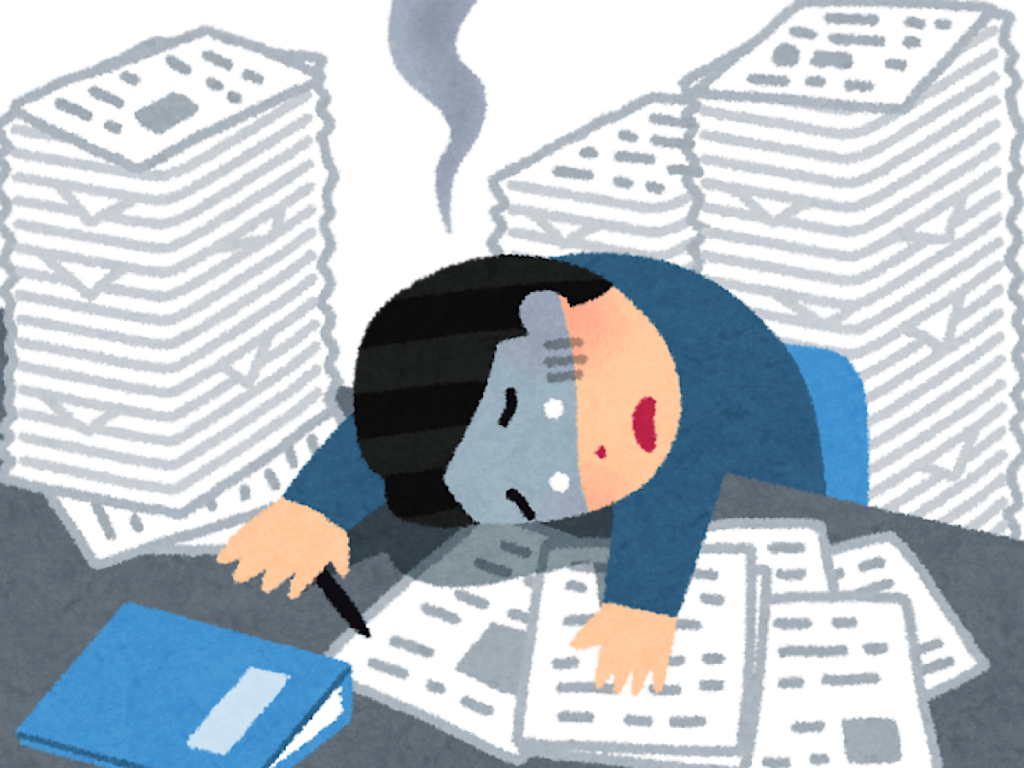
Zangyo (残業) means working overtime. It happens a lot. Compared to 20 years ago, the situation is getting better. Companies encourage you not work overtime if it’s not necessary. That being said, the reality is a bit different. Your company urges you to leave the office as earlier as possible. And your boss says that you can leave the office as long as you finish your job. Oh, dear! Nothing happens on such a day. At the beginning, you might be the first person to leave your office. However, as you get used to your job, there might be something that feels off about leaving the office earlier than any other member. Sometimes the company expects you are willing to work overtime.
4. Respect For Senpai (先輩)
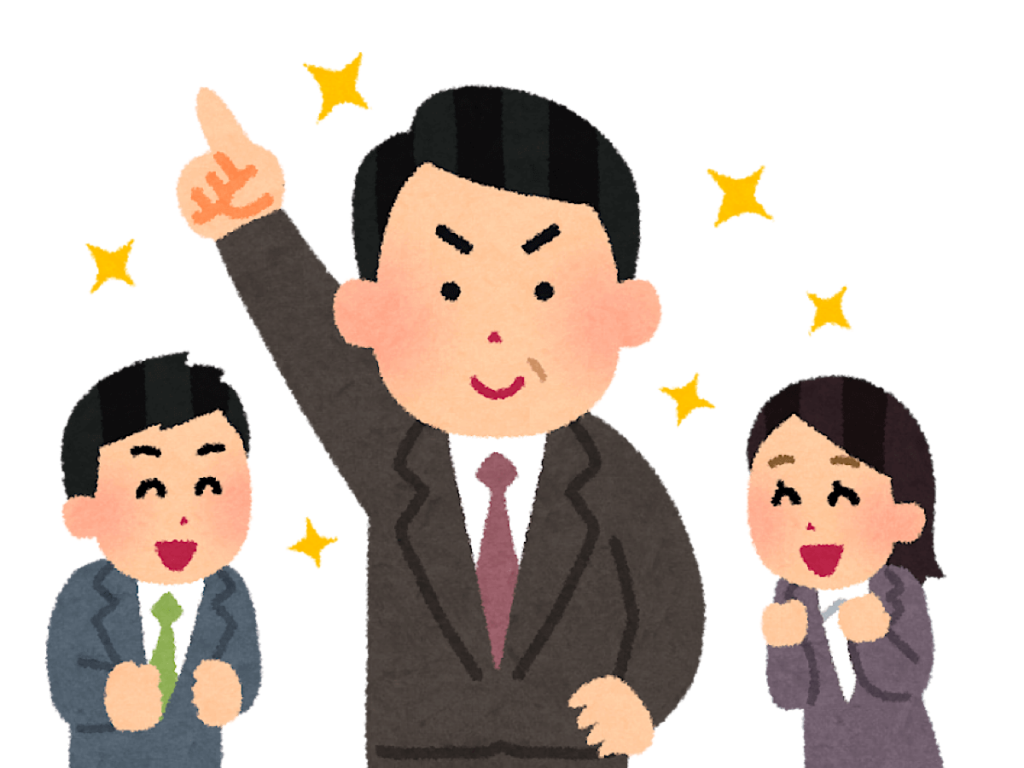
Generally speaking, you have to build good work relationships with your colleagues and boss. The first priority is the president of your company, of course. Other than that, you have to watch out for the person who has a job title. In addition to people with a job title, there is senpai. It’s a unique part of Japanese culture. We have to tip our hat to them. Senpai (先輩) means elderly people, but it doesn’t necessarily mean your age, it also means the time that they are working at the company. In Japanese culture, a senpai has to take care of younger colleagues. I was told that by many senpai. You would handle every situation and roll with the punches at your workplace if you find a good senpai.
5. Drinking Culture
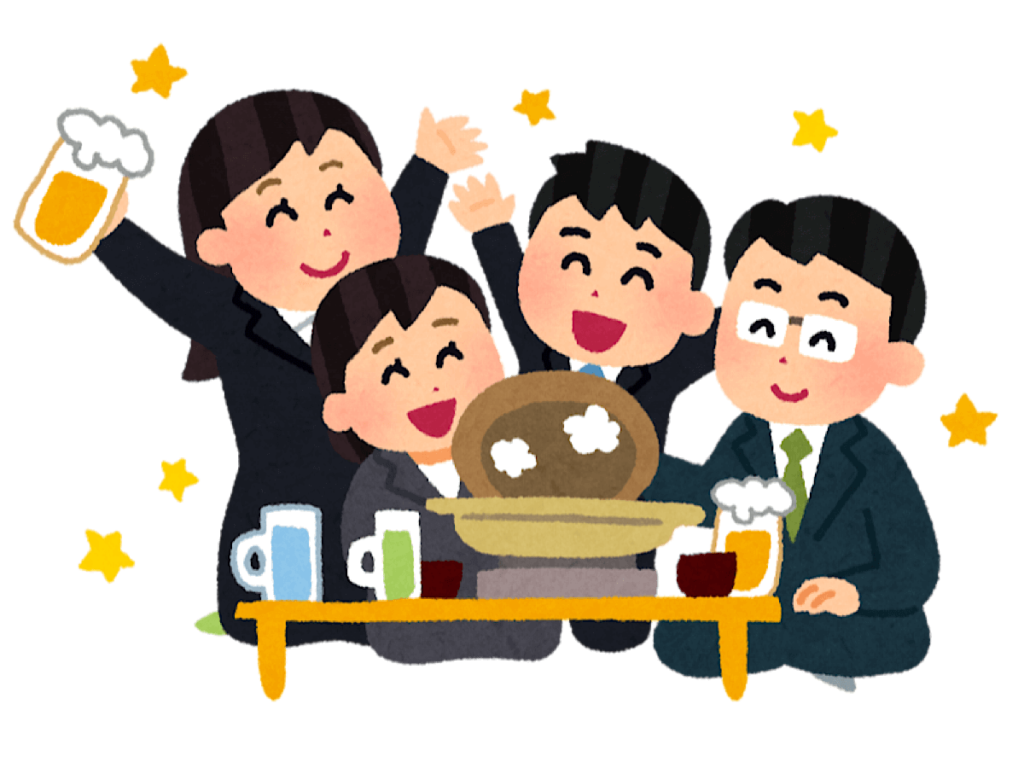
Coworkers aren’t necessarily honest at the workplace. Oftentimes we have to choose the attitude that we are supposed to have in this situation, even though you don’t want to do it. You need to serve your company and organization. Drinking culture helps those relationships. It is believed that drinking lets you get things off your chest and is a good opportunity to have a heart-to-heart with coworkers. We call drinking at the workplace “Nominication.” It’s Japanese English, and is a combination with nomikai (飲み会) and communication. It means you can communicate with coworkers frankly through the drinking party. You might think, “What if I don’t drink? That’s OK, you just order a non-alcohol drink and be there. Nominication is a kind of unique custom that is dying in this age, but still you might see your boss who always has a strict face cut loose. I agree that nominication is important to unite a team at a certain level. Let me explain the typical manner of nomikai here.
Rule no.1 the manner of kanpai

Kanpai means to toast, raise your glass and hit softly other people’s glass. The point is to adjust the height of your glass to other’s. If they have a higher job title, you should hit your glass to their lower part of the glass. It shows respect for people of higher positions or guests.
Rule No.2 watch out for your boss’s glass.
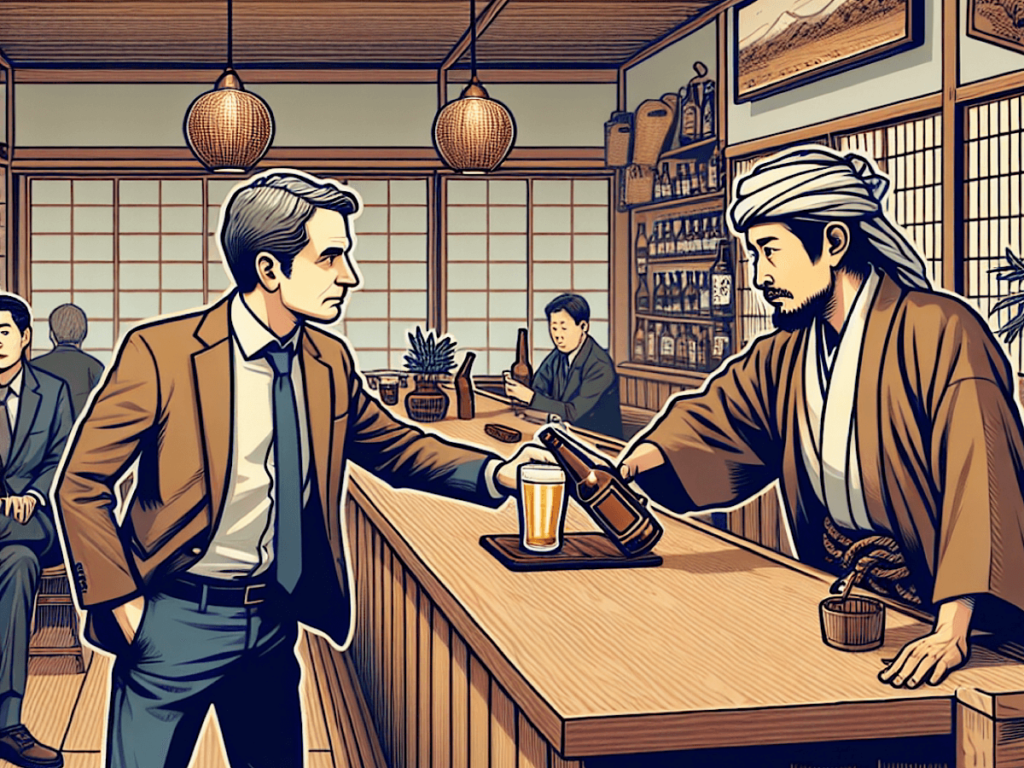
No matter how much you drink, you have to check if your boss’s glass is full or half empty. If the glass is less than three quarters, you may fill the glass. Now, when you pour the beer, you must hold it with both your hands as opposed to a single hand. To hold with both hands shows respect for the person for whom you’re pouring. You have to be an auto-fill-machine at nomikai.
Rule No.3 Pouring for each other
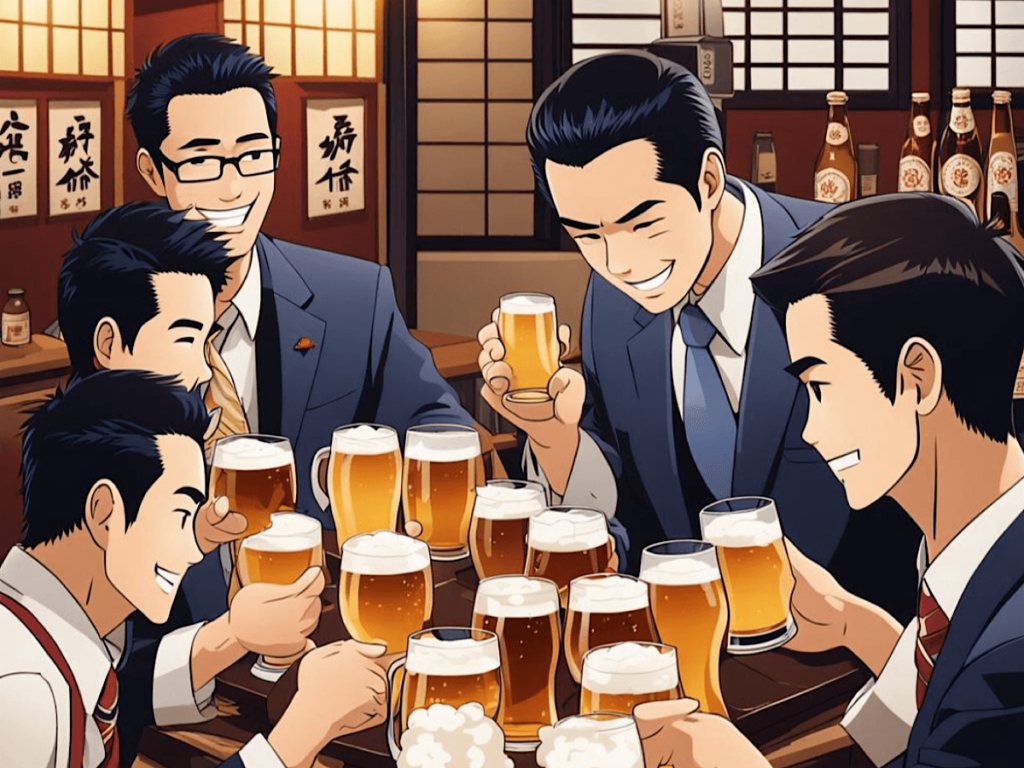
Except for your boss, colleagues often pour for each other as long as they drink the same drink. It’s not that strict of a rule like for your boss. When you see a colleague’s glass empty, you just ask them if they want or need more.
Rule No.4 Cutting loose

We have a special customs called “bureiko (無礼講),” which means you are allowed to do “almost “ anything at nomikai. Still Japanese people are tolerant of events at nomikai. It’s said that the stupid things that you did are forgiven. Even if your boss did them. In that way, we build good relationships with our boss and coworkers. A long time ago, it’s believed that every single guilt action was forgiven because you drank too much. However, it is not true nowadays. There are people who are sober. Plus, you should know that things you’ve done are captured by someone’s smartphone these days.
Rule No.5 The Time of Leaving

The funny thing is, your boss decides when the nomikai closes, as opposed to you. The time of leaving is called “ohiraki (お開き). So your boss is required to have the ability of catching other people’s feelings and time management. Like if people feel bored, then he or she decides to finish the nomikai earlier. Usually, there’s a second round called “nijikai (二次会).” Most people go to nijikai, and you might get to confused how to decline the proposal.
How was that ? These customs are rooted in Japanese culture. Oftentimes, you might get confused. As you get used to it, nomikai is a good opportunity to get along with coworkers and bosses. I just wanted to give you a heads-up, “Don’t do any stupid things, no breiko, the camera sees every single corner.” Just joking, thank you for taking the time to read my article to the end. The rule of thumb is to enjoy it with a polite manner. Have a wonderful nomikai, and see you in my next article soon!
I worked at a trading company for many years. I live in Tokyo with my wife. Love skiing, traveling, IPAs, wine , X-treme sports, fashion, and learning English and Chinese.



 HTJ has a YouTube page! Check it out
HTJ has a YouTube page! Check it out